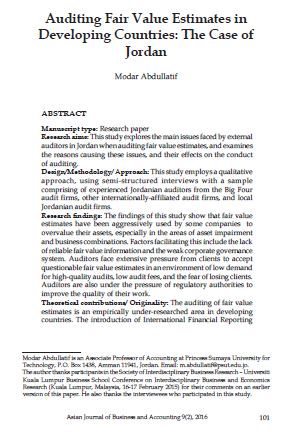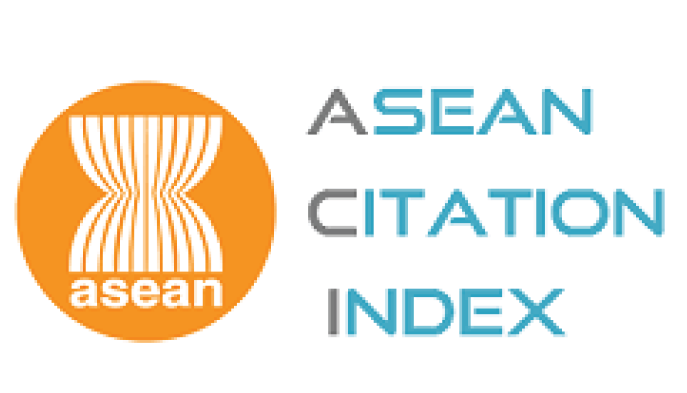Auditing Fair Value Estimates in Developing Countries: The Case of Jordan
Abstract
Manuscript type: Research paper
Research aims: This study explores the main issues faced by external
auditors in Jordan when auditing fair value estimates, and examines
the reasons causing these issues, and their effects on the conduct
of auditing.
Design/Methodology/ Approach: This study employs a qualitative
approach, using semi-structured interviews with a sample
comprising of experienced Jordanian auditors from the Big Four
audit firms, other internationally-affiliated audit firms, and local
Jordanian audit firms.
Research findings: The findings of this study show that fair value
estimates have been aggressively used by some companies to
overvalue their assets, especially in the areas of asset impairment
and business combinations. Factors facilitating this include the lack
of reliable fair value information and the weak corporate governance
system. Auditors face extensive pressure from clients to accept
questionable fair value estimates in an environment of low demand
for high-quality audits, low audit fees, and the fear of losing clients.
Auditors are also under the pressure of regulatory authorities to
improve the quality of their work.
Theoretical contributions/ Originality: The auditing of fair value
estimates is an empirically under-researched area in developing
countries. The introduction of International Financial Reporting Standard (IFRS) 13 (Fair Value Measurement) places the demand
that an estimate of fair value has to be reported when needed,
regardless of the level of available information or market activity.
Conducting a study in a developing country with an environment
that is characterised by inactive markets, limited available
information on fair values, and low demand for high-quality audits,
can further contribute to knowledge on how fair value estimates
are audited under different circumstances to those of developed
countries.
Practitioner/ Policy implications: The findings of this study show
that there is a need for regulatory authorities to put in more efforts to
scrutinise the behaviour of auditors and audit clients when dealing
with fair value estimates. The regulatory authorities also need to
improve the conditions auditors face when auditing these estimates.
Such improvements could include increasing the monitoring of fair
value specialist evaluators, revising audit fee levels, and revising
corporate governance regulations.
Research limitations/ Implications: This study focuses on the
Jordanian environment. By expanding the research to other
developing countries, and by focusing in detail on some of the
issues studied in developed countries (such as how auditors
assess management’s assumptions regarding fair value estimates,
and how they develop their own independent estimates), a better
understanding of these issues in the developing country contexts
can be gained, benefitting the audit profession and contributing to
literature at the same time.
Keywords: Auditing, Developing Countries, Fair Value Estimates,
Jordan.
JEL Classification: M42
Downloads








